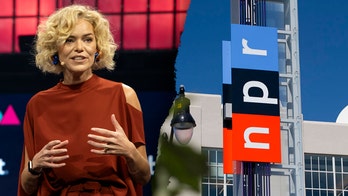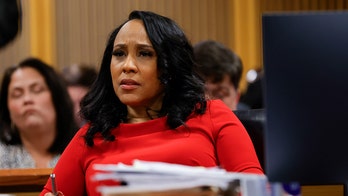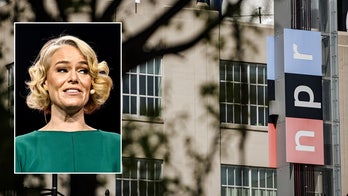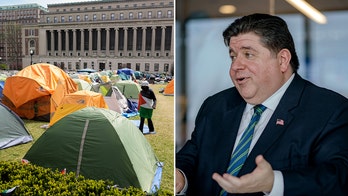LITTLE ROCK, Ark. -- Facing off in a televised debate against her two rivals for the Democratic Party's nomination for the Senate seat she holds, Sen. Blanche Lincoln (D-AR) traded polite jabs with Lt. Gov. Bill Halter, even as both expressed disappointment about the tone of their increasingly intense primary campaign.
Moderated by a local TV anchorman, the one-hour showdown at the University of Arkansas at Little Rock saw the candidates repeat familiar thrusts on the issues that have dominated the contest thus far: health care reform, Wall Street bailouts and the financial regulatory overhaul, and the blitz of negative TV ads run by both campaigns and by outside groups that have joined the fray.
Though he never deviated from his usual posture of Southern civility, Halter went on the attack against Lincoln early and often. But the two-term senator, seen by analysts as one of the most vulnerable incumbents in this year's midterm elections, seldom returned fire directly, opting instead to remind the audience of her specific policy goals and achievements as chairman of the Senate Agriculture Committee.
The most barbed moment of the debate, which also featured little known businessman D.C. Morrison as the third candidate on the stage, came when Halter renewed his attacks on Lincoln for her campaign's acceptance of contributions from Goldman Sachs. The New York investment bank is presently under civil indictment by the Securities and Exchange Commission on federal fraud charges. "I asked Senator Lincoln to give back the contribution that Goldman Sachs made to her campaign, because they are currently under SEC investigation for fraud," Halter said. "And I just think it's unseemly to be simultaneously raising money from the very folks that you're supposed to regulate, particularly when those folks wrecked our economy."
Lincoln responded that the $4,500 her campaign received from Goldman Sachs' political action committee never influenced her votes in the Senate. Not until fairly late in the debate did she launch a direct attack of her own on Halter - and even when she did, it was framed in civil tones, using the lieutenant governor's first name in an almost chummy fashion. "I know that I have consistently opposed attempts to privatize Social Security," Lincoln said. "Bill has mentioned in speeches elsewhere, though, that he does believe that there's an opportunity possible to be able to invest Social Security monies in Wall Street. And we know what would have happened had we done that."
Both Lincoln and Halter, who trails the senator by double digits in statewide polling but hopes to win over the estimated 20 % of primary voters that remain undecided, lamented the increasingly negative tone of their contest. "The problem is I'm being outspent three-to-one," Lincoln said, by way of defending her resort to TV attack ads. "There's a tremendous number of outside groups that are coming in, spending large [amounts] of money in Arkansas…running negative ads against me…But those people won't tell you who they are. They put a tag-line at the bottom that's a crafty name that they've made up…trying to tell you who we should be in Arkansas, and what you should think about me."
Halter accused Lincoln of running "dishonest smears" against him on the Social Security privatization issue, and read aloud from independent analysts who have assailed the accuracy of Lincoln's ads. Then Halter offered a truce: "I've taken down a website that's called 'Bailout Blanche.' And senator, I would ask you, as we go forward, if you would stop referring to me as 'Dollar Bill,' if you would cease the negative mailers. Let's present the positives that we want for Arkansas, for our future, for our kids."
The format of the debate prevented Lincoln from responding to Halter's proposal. Her campaign has called the lieutenant governor "Dollar Bill" to underscore the allegation that a company he once helped run outsourced American jobs to India. The sobriquet of "Bailout Blanche," brandished by the Halter campaign, refers to Lincoln's ties to Goldman Sachs and her vote in favor of the 2008 Troubled Asset Relief Program (TARP).
No knockout blows were scored, however. The primary will be held May 18. If Morrison, who has polled as high as 10 % by some accounts, can deny Lincoln or Halter 50 % of the primary vote, the top two vote-getters will be forced into a June 8 runoff.
Friday night it was the physically imposing Morrison, a mild-mannered agricultural loan broker who towered over the other two candidates, who provided the sharpest contrasts in policy positions and the evening's most raucous moment of comic relief. He called global warming a "hoax," vowed to oppose any Supreme Court nominee that has expressed support for abortion rights, and said he would cut spending for every federal program except the national defense and Social Security.
When Lincoln and Halter complained about the spate of negative TV ads, Morrison brought down the house three times with his deadpan delivery: "I've enjoyed the ads. And I used to think that talk was cheap until I found out what Channel 7 charges for television ads. But it's worth every penny and if I had the money I would do it!"




